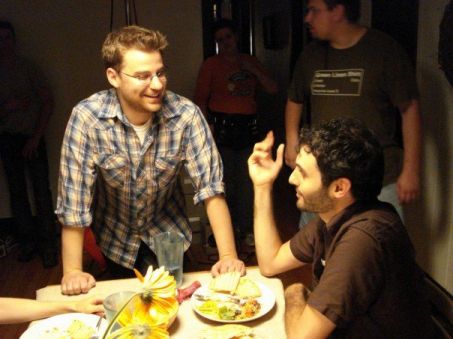Interview: Filmmaker Stephen Cone
By Rob Christopher in Arts & Entertainment on Feb 23, 2009 8:15PM

filmmaker Stephen Cone (standing) talking with actor Arian Moayed
Chicagoist: How did you get into film?
Stephen Cone: I've been movie obsessed since childhood and always knew I'd do something associated with movies, whether it be directing or acting or writing or producing or whatever. I'm 28 and have spent my twenties kind of figuring it all out. I acted in college and then dabbled in acting and playwriting and theatre directing in New York and Chicago before buckling down in 2005 and making my first wildly over-ambitious short film (I'm still paying it off but that's okay 'cause my first few films have been my film school) that no one's really seen. Since then filmmaking has been my number one thing and I'm narrowing my focus on it more and more. This is it for me, I think.
C: Your last film had a pretty edgy concept: a bona fide examination of the limits of personal belief without shallow dismissiveness or blind embrace. What was the genesis of that project?
SC: I'm sure it has something to do with the fact that I'm the son of a Baptist minster, so I guess that's why me and a lot of my work has always been a little God-haunted, whether H/he's there or not. Logistically and pragmatically speaking, I wanted my first flirtation with the longer form to be largely stress-free and so I focused on writing something that could take place more or less in one location and feature only a handful of actors. So, a kind of chamber piece. Thematically-speaking, I didn't want to fall into the trap I see a lot of no-budget filmmakers falling into, namely, that of low-stakes - nothing really happens of any consequence to no one you really care about. So, still having much affection for the Christians I grew up with and around, I decided to attempt to tell an honest story about fear and doubt and even sexuality in religious folks, without resorting to the one-dimensional or stereotypical. I'm hard-pressed to think of a more interesting human conundrum - at least to me - than a person of faith living in a physical body. Herein lies a central interest of mine, and the primary reason why I seem to consistently be dealing with, literally, Christian bodies.
C: The new film seems to have a much different theme. How did that idea start rolling around in your head?
SC: Certainly this next one will be tonally and stylistically different from The Christians, but, although there is never an overt reference to God or spirituality, it does have a lot to do with mortality and how we strive to transcend it and make the most of our time here. Or something like that. Maybe it's just about a guy finding his way. Or both. Or other things. Ha! We'll see. I haven't even shot it yet.
C: But you start shooting soon. Tell us how you've organized that.
SC: We're shooting in two blocks of ten days - March 6-15 and May 1-10. Several reasons for this - want to get started sooner rather than later so editing can begin and a cut can be ready for late summer/early fall festival deadlines; lots of dayjobbers on this thing so easier to ask time off for two blocks than one big one; can spread out borrowing of equipment, etc. Relatively speaking, it's pretty simple (if the script itself is not). I've had a good amount of folks on set for my first couple of films and wanted to do something small-scaled but ambitious for this one. As a young, self-taught filmmaker, I feel that I finally kinda know what I'm doing. So last August I got a hold of a great young Director of Photography, Stephanie Dufford, in order to collaborate on kind of a test weekend, just to see what sorts of things, aesthetically, could be achieved with just a DP and a camera. So we shot seven experimental shorts in a day and a half, with just her and me and a handful of actors - and the results were pretty impressive.
C: Funding has always been tough for indie filmmakers, and it seems like these days it'd be doubly tough. How have you managed to pull it off?
SC: Willful ignorance, mainly. Obsessive contact-making. Also, an awareness and appreciation of the beauty of a pared down production, and of the astonishing (and astonishingly inexpensive) resources available to the 21st century filmmaker. But also by the generosity of many wonderful people - this includes friends and family donations; cast and crew willing to work for much, much less than they deserve; companies like Split Pillow willing to jump in and take a chance; and friends like my no-budget producing partner Gina LoPiccolo, who, without any film background (much like myself), has been willing to devote time and energy and money to help me make my films. But mainly it's about putting the thing out there, and setting the date. To twist and mangle and paraphrase a sentimental favorite film of mine - If you build it, it will exist. Then, have faith that they'll come. Eventually. We've pared it down to a swift, efficient crew of six. We're still scraping together our tiny budget and all the resources we can. It's all very stressful and exciting. Fact of the matter is - these days most filmmakers have two options: make a film with whatever you can scrape together or not make it at all. I choose the former.